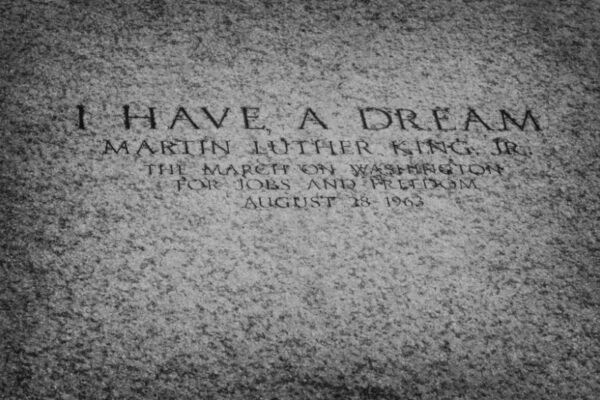As we celebrate the birth of Martin Luther King Jr. today, we also note that this year marks 50 years since his assassination. While this length of time might not seem very long, in some respects, the passing of Dr. King was a lifetime ago.
Arguably, the United States has changed markedly since the heady days of the civil rights movement. Most obviously, perhaps, the culture of Jim Crow segregation, while remaining a traumatic memory for African American elders, is for many others merely something that occupies a fleeting place in the wider national consciousness. In other respects, however, the U.S. today is perhaps not much different from how it was in the 1960s.
It’s not hard to detect a profound schism in the ways in which a racially divided U.S. both regards and reflects the legacy of King’s civil rights movement.
Broadly, white America is more likely to think about how far it has come, how much progress it has made, toward racial equity. Black America, on the other hand, is more likely to think about how relatively little real progress has been made, and about the ways in which challenges such as allegations of police brutality continue to dominate.
But behind this schism lie tensions that are seldom part of the national conversation. In short, many white Americans view the agenda of racial progress in terms of concessions they have had to make.
Consequently, a more just and equitable society is not regarded as a benchmark of progress, but is instead indicative of ground conceded, or compromises that have had to be made, toward a supposedly more tolerant society. Black Americans, though, are unlikely to see themselves as the beneficiaries or recipients of whatever concessions the wider society thinks it has made, or thinks it has had to make.
So, what might King make of U.S. foreign policy and today’s racial state of affairs? King opposed the war in Vietnam, which continued for the greater part of a decade after his murder. It’s not hard to imagine him joining forces with those within the U.S. and around the world who stand in opposition to current hostilities.
Similarly, we can image King urging restraint or advocating caution, resisting the widespread euphoria that heralded the arrival of President Barack Obama as the dawning of a new era in U.S. race relations and progress.
And it’s not hard for us to imagine King speaking from his pulpit against the escalation of setbacks the nation has endured recently. After all, the civil rights movement was itself an encapsulation or a manifestation of the sentiment that Black Lives Matter.
But perhaps most importantly, I imagine King would look at America today and be a staunch advocate of the rights of all poor people. Over the course of the 20th century, the notion that poverty was a state of being firmly and exclusively located within the African American demographic gained ever-greater traction.
This has had the catastrophic effect of consigning to the margins of political discourse many issues relating to combatting poverty in the country. Many white Americans live in poverty, but white poverty is by and large unrecognized and unattended to by the nation’s lawmakers, who perpetuate the presumed link between race and poverty.
One of the ways in which King was such a revolutionary was that he offered the dominant power structure nothing for its comfort. He would surely have continued to campaign for a nonracial economic progress in which the riches of a wealthy nation were more equitably distributed, thereby creating a more genuine culture of equal opportunity.
With what amounts to widespread economic segregation having replaced racial segregation, the country needs champions of the poor, such as King was, now as much as at any time in our history. To be sure, other energetic and passionate advocates of a more just economic system have come and gone in the years since that fateful day in April 1968. But few can disagree that King’s assassination robbed the world of one of history’s most important advocates of humanity’s cause.
Eddie Chambers is a professor of art and art history at The University of Texas at Austin.
A version of this op-ed appeared in the Dallas Morning News, San Antonio Express News, Corpus Christi Caller Times, The Rivard Report, and the Waco Tribune Herald.
To view more op-eds from Texas Perspectives, click here.
Like us on Facebook.




